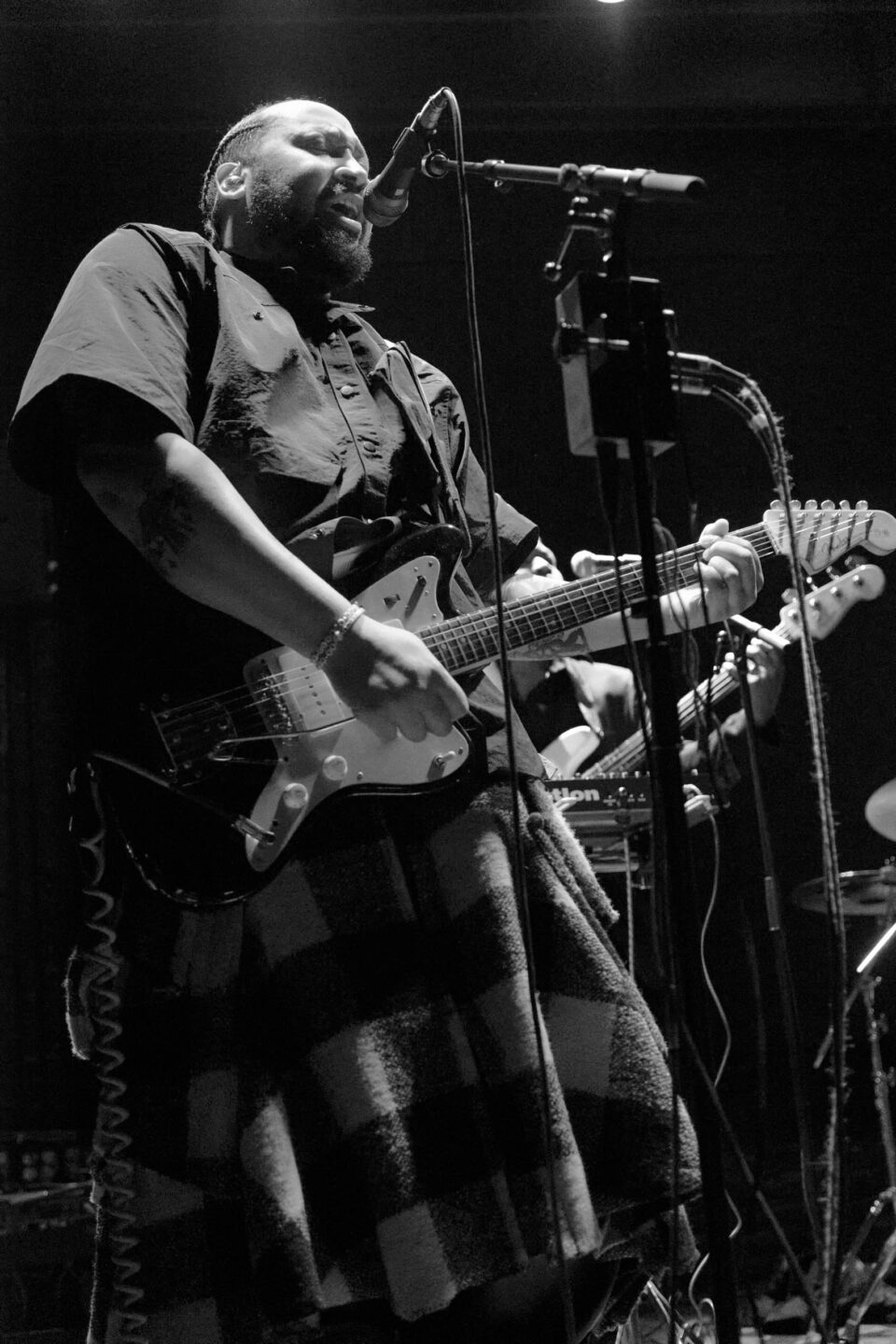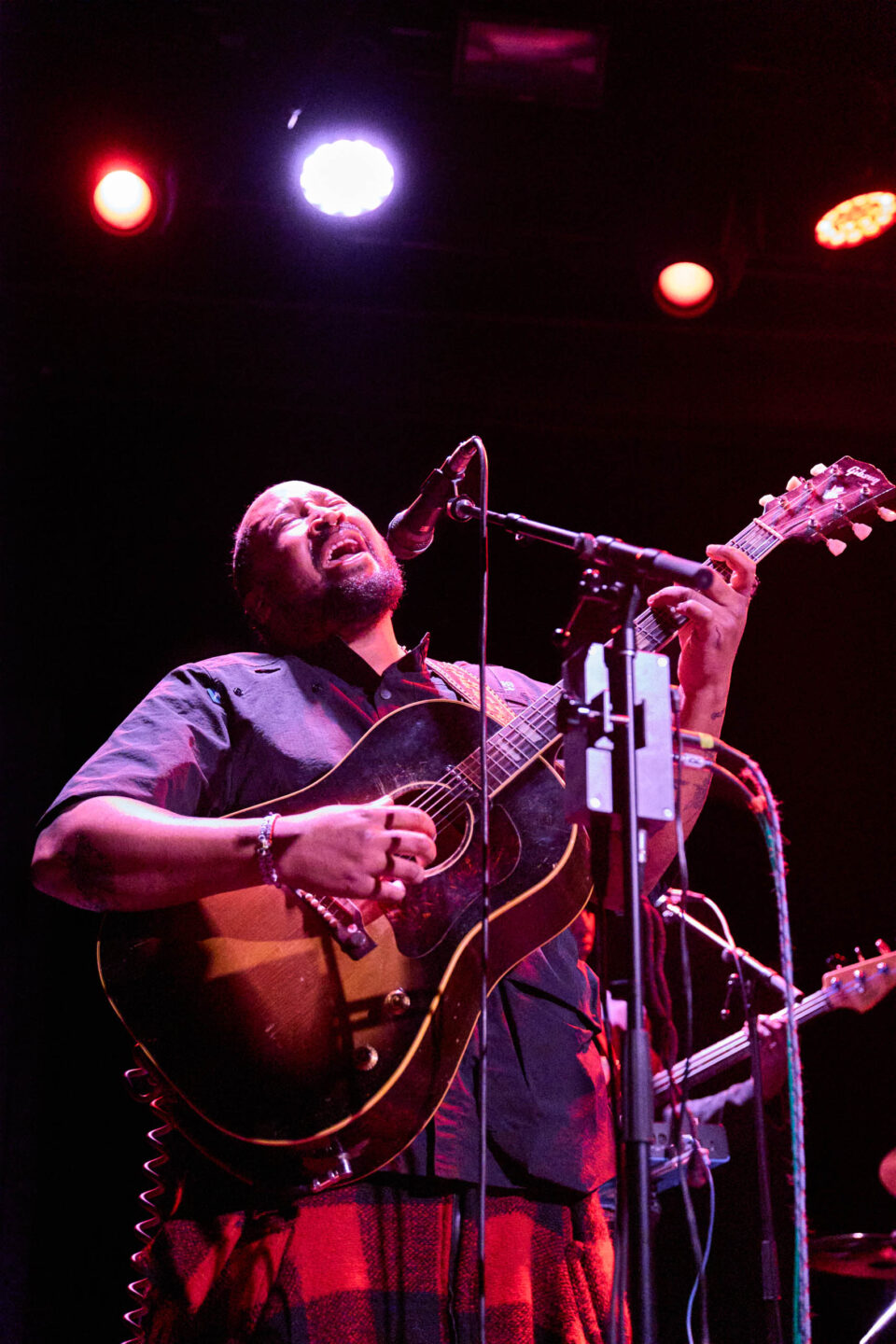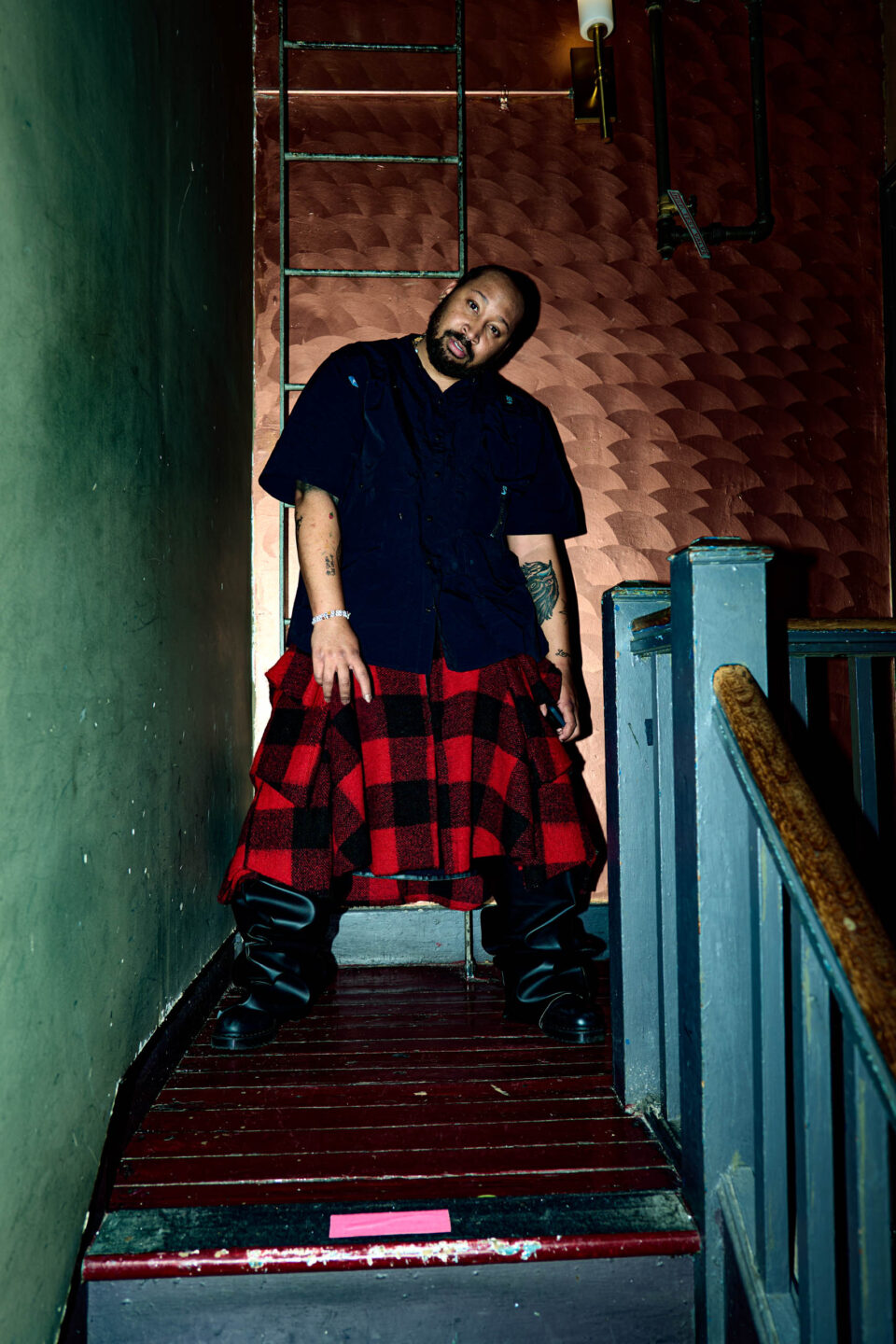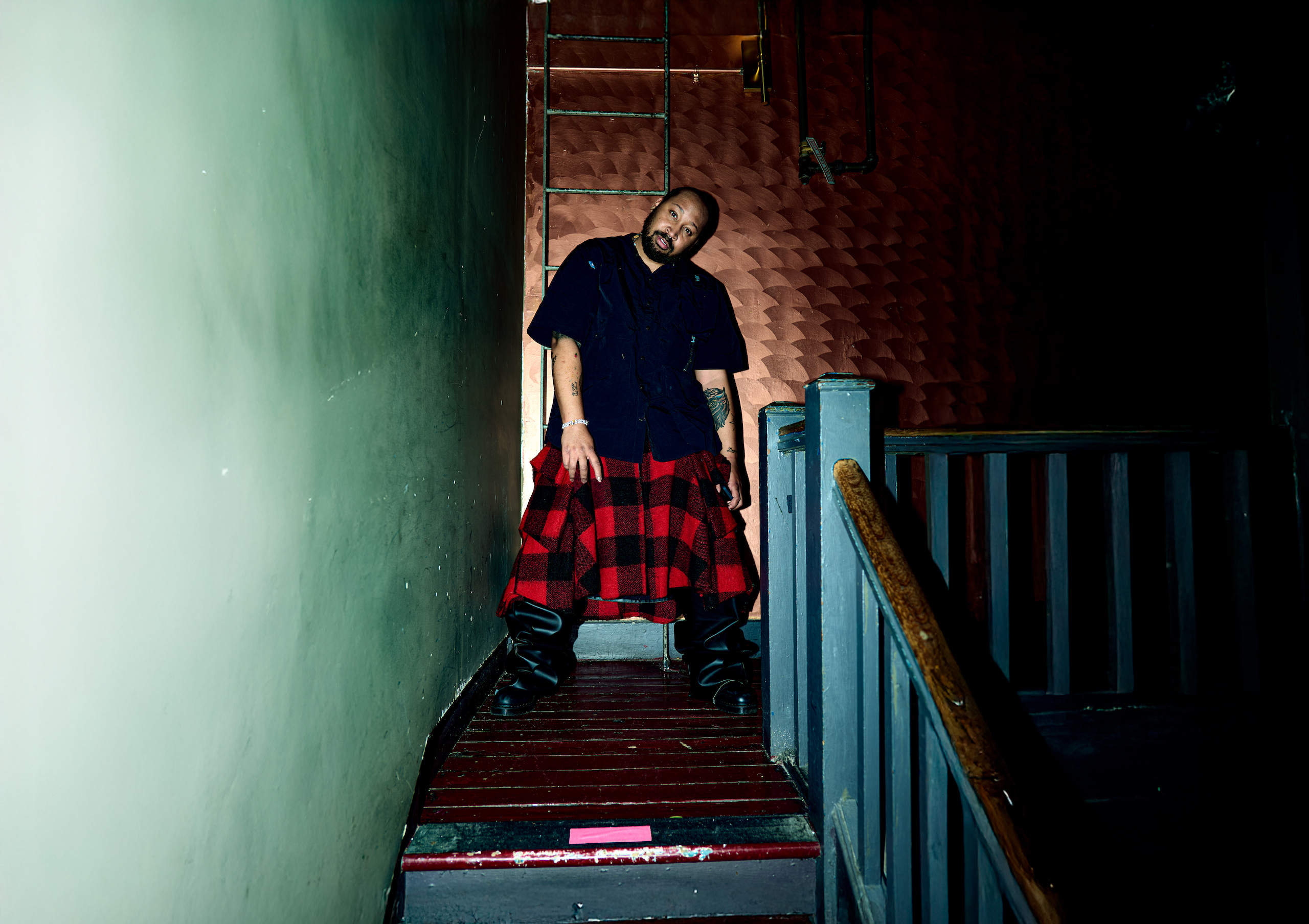The Bartees Strange we see on the cover of his third album, Horror, is not the one we’ve become accustomed to over the past five years. Buried under a jet-black coat, he embodies a darker version of himself, the type of figure that may taunt the Bartees Strange we do know in his nightmares. The sound of Horror may not immediately jump out as dark and twisted like the cover might imply, but that belies the real everyday terror within the lyrics. “I wanted to create a character that was a little larger than life,” Strange tells me over a Zoom call. “I wanted to present it as, ‘This is horror,’ but it’s more layered than, ‘Boom! Monster under your bed.‘”
To help bring this vision to life, Strange initially enlisted the help of Yves and Lawrence Rothman to track the foundations of the record in LA. This was so close to the recording of his previous album, 2022’s Farm to Table, that some of the Horror songs almost made it onto that tracklist, but Strange would hold them back as an entirely different aesthetic began to take shape. To see this new vision come to fruition, he linked up with one of pop music’s most sought-after names in Jack Antonoff after the pair connected at a GRAMMY afterparty. Hitting it off right away, Strange learned a lot from his time in the studio with Antonoff, and the pair found their working relationship to be incredibly easy. “He has this amazing understanding of how much space is in a song, when to take things out, when to add things,” Strange says. “He was a master of dynamics.”
Strange’s work to date has been an impressive amalgamation of his interests. Usually based around indie rock, his songs will suddenly shoot off into hip-hop beats or break into electronic passages on a whim. We hear it right from the start on Horror, with opener “Too Much” emphasizing the best of this shapeshifting nature. Halfway through, the track switches from serene, sunlit riffs into a flow of bars that are equally slick before snowballing into an intensity of earth-shaking proportions.
Strange has a level of assertiveness in his vocals which means that once he gets going, it’s incredibly hard not to be taken along for the ride. As he tells me, he’s picked up a few tips from some hip-hop legends. “I love MF DOOM just because he could say things no one else can say, and the way he built worlds with his music is pretty astounding,” he explains. “I think the biggest thing I glean from great rappers is how much of their personality and their self they bring. Like Kendrick [Lamar]—we all love Kendrick as a person, and you can hear that through the music.” Elsewhere on the record, “Lovers” is laden with dancefloor mystique as Strange wanted to make “the biggest house song I could.” He namechecks Burial and Four Tet as two of his favorite electronic artists, with the former’s “Archangel” being one of his most listened-to songs.
Each new avenue and idea explored in his sound exemplifies the type of artist who has an insatiable sense of curiosity. Some may think that the breadth of his work might cause confusion—an artist’s identity is often closely attached to genre, after all, but in Strange’s case it speaks to a sense of self-discovery and sees different parts of his life brought together into what we see as a display of eclecticism. “I wasn’t making stuff like this in my early twenties, when I was in hardcore bands. It all blended into one thing over time. For most artists, it’s about finding your voice, trusting it and going for it. That’s what I feel I try to do with my music, even though it may be a little off-the-beaten-path.”
“For most artists, it’s about finding your voice, trusting it and going for it. That’s what I feel I try to do with my music, even though it may be a little off-the-beaten-path.”

The premise surrounding this latest project is that the horrors we face in our everyday existence aren’t necessarily grotesque, but very real struggles that plenty of other people also face throughout their lives. “Baltimore” sees Strange thinking about parallel universes, pondering what life would’ve been like had he moved to certain places. He realizes that he wants to settle down, but has no idea when or where that will be possible. He taps into a common anxiety about the factors of our lives that we can’t control, implicitly conveying horror within that panic.
Strange’s struggles dominate the record, with none being more clearly stated than in the line, “The first time I felt impending doom / Was realizing I’m too Black for the room” on “17.” “I remember moving around and being in mostly white spaces, professionally,” he recalls. “After a while, it can wear on you—you put on so many masks to fit in and please people, and you can lose yourself in the process, which I think happened to me.”
Growing up in Ipswich in the UK, Strange moved around because of his dad’s job in the military, frequently relocating to largely rural and conservative towns across the US. This led to Strange struggling for a sense of place, a feeling that would repeat itself later in life as he entered the white-dominated indie-rock scene. His music now serves as an escape, where he no longer has to serve the ideas of what people would want him to create. “Music was a way to be more myself. I’ve done so many things in life that I didn’t want to do, but I did it because I thought people wanted me just to fit in.”

“There are mistakes you make in life, and you hit periods where you need to reflect. This record was that for me, where I was looking at myself and figuring out ways to change.”
Horror has been a way to exorcise demons—or at least begin down the path of doing so. During our conversation, Strange is open about the role therapy has played in his life and actively encourages people to seek it out so that you have someone outside of your immediate circle to talk to. The writing process for the record helped him to understand himself better, too, as he didn’t know what he wanted to write about before it all poured out. “There are mistakes you make in life, and you hit periods where you need to reflect. This record was that for me, where I was looking at myself and figuring out ways to change.”
The conclusion we can take away from Horror is that we need fear in our lives—we need to be able to prove that we can overcome the various challenges that are caused by all manner of personal and societal issues. In embodying his fears, Bartees Strange is beginning to take ownership and flip the script on feelings and experiences which had previously hindered him. “The world is so big and there are many ways to go about living in it. You try to move through the things that scare you to become the best version of yourself and you will fail sometimes. But that’s the whole point of being alive: falling down and getting back up.” FL








